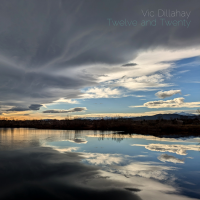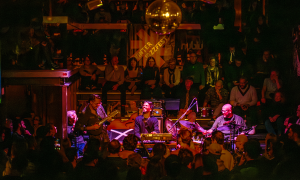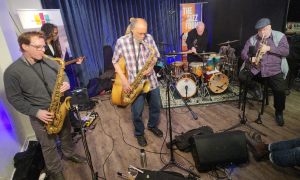Home » Jazz Articles » Live Review » Bill Frisell Quartet
Bill Frisell Quartet
Presented as a part of a "Gershwin and Beyond" series, Frisell began with brief, but worthy versions of four Porgy and Bess tunes. He chose not to piggyback on the classic Miles Davis - Gil Evans treatments that have more or less redefined the pieces for the jazz world over the last forty years. "Summertime" began with a free segment and evolved into a Frisell - Wolleson duet with Frisell emulating a steel pan before gradual disintegration. Frisell rendered "Someone to Watch Over Me," "It Ain't Necessarily So" (as a mazurka), and "My Man's Gone Now" in close-to-the-vest melodic variations over subtly shifting rhythms. Leisz switched to mandolin for a pre-WWI flavored "Swanee" (in cut time) that ended with a reference to "Old Folks at Home."
The remaining tunes, original compositions, evoked a variety of moods: an old-time blues; a New Orleans-tinged piece with two-way guitar interplay; a quiet Mexican folk song (near "La Paloma") with Frisell on six-string acoustic guitar, Wolleson accenting with fingers (left hand) on snare drum and a brush (right hand) on cymbals; a groove tune with an "In A Silent Way" feel warmed up by Frisell; and a couple of continually evolving Texas-flavored numbers.
The two guitarists often played subtly interwoven variations, relying heavily on sonic variation achieved through electronics. Frisell frequently adjusted his guitar amplifier settings, some of which appeared to be hooked into programmed loops. Wolleson, the jewel of the band, freely danced around the string players. Relying entirely on instinct he provided the dynamic yang. Bassist David Piltch has gigged with Tom Harrell and other swing-informed jazz musicians but he to play with a static, predictable feel to fit the music's humble mood. He bowed simple lines during his occasional solos.
James Carney (February 2) and Steve Coleman (February 23) are scheduled to continue the jazz concerts at the Skirball.
Bill Frisell - guitars; Greg Leisz - steel guitars; David Piltch - stand-up bass; Kenny Wolleson - drums.
Tags
PREVIOUS / NEXT
Support All About Jazz
 All About Jazz has been a pillar of jazz since 1995, championing it as an art form and, more importantly, supporting the musicians who make it. Our enduring commitment has made "AAJ" one of the most culturally important websites of its kind, read by hundreds of thousands of fans, musicians and industry figures every month.
All About Jazz has been a pillar of jazz since 1995, championing it as an art form and, more importantly, supporting the musicians who make it. Our enduring commitment has made "AAJ" one of the most culturally important websites of its kind, read by hundreds of thousands of fans, musicians and industry figures every month.
























